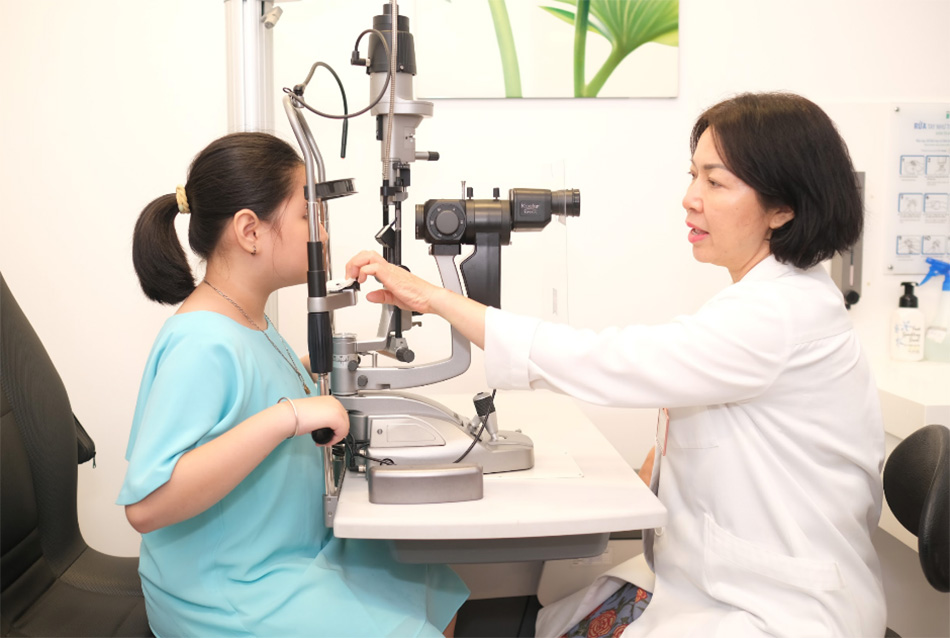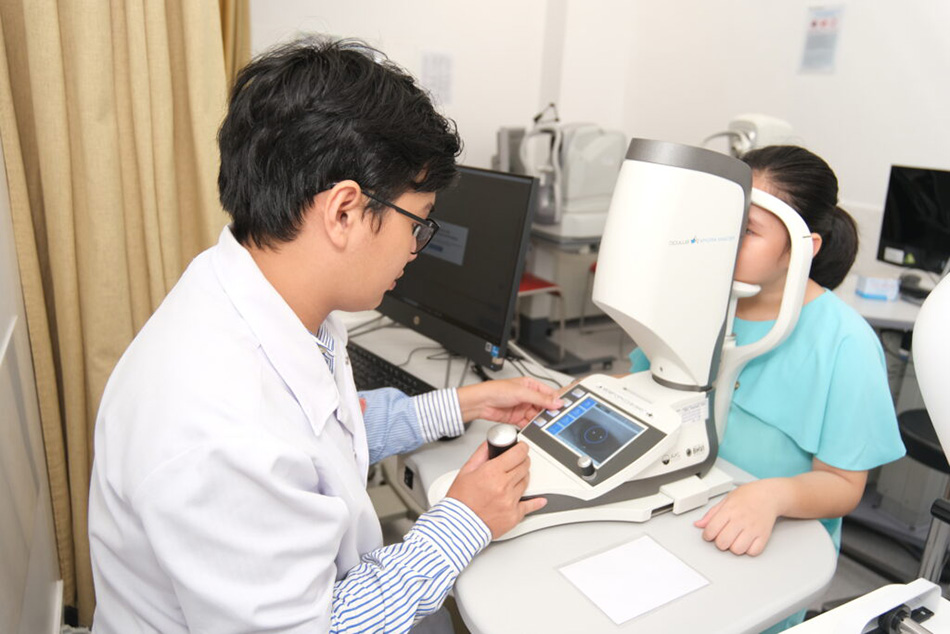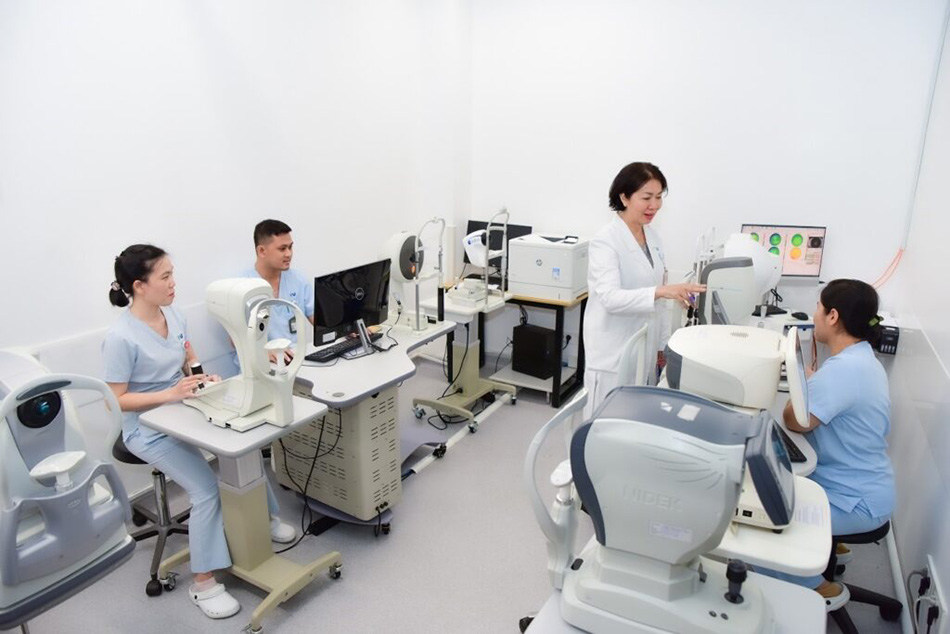FV Hospital has launched the Myopia Control Programme for children aged 3-18 with the support of the Myopia Master Measurements for Myopia Management, which helps detect myopia risk before symptoms appear.
The Myopia Control Programme at FV will screen for myopia risks, predict future myopia levels, and provide a myopia control plan for children to prevent the risk of dangerous eye diseases caused by refractive errors.
Myopia: The “Silent Epidemic” Threatening Children’s Vision
In modern society, the incidence of early-onset and progressive (high) myopia in children is on the rise. In many classrooms, children without glasses have become a rare sight. Surveys show that the rate of myopia among children in major cities can reach up to 70%. The World Health Organization (WHO) considers this a “silent epidemic” among children and estimates that by 2050, 90% of children in Asia, including Vietnam, will be myopic. Despite its prevalence, myopia can be controlled to limit complications that lead to vision impairment or blindness if detected early and managed according to appropriate protocols.
According to Dr Nguyen Thi Mai, Head of the Ophthalmology & Refractive Surgery at FV Hospital, lifestyle factors, in addition to genetic predisposition, are the main causes of the increasing prevalence of myopia in children. Children today spend less time outdoors and more time using electronic devices, leading to earlier onset of myopia, faster progression, and higher degrees of myopia in adulthood.

The habit of using electronic devices and spending less time outdoors is leading to an increase in myopia among children.
“There is no safe zone for myopia. Even mild myopia can increase the risk of serious future eye complications. Higher degrees of myopia significantly elevate the risk of severe vision-threatening conditions such as retinal detachment, macular degeneration, macular holes, glaucoma, and cataracts. Progressive (high) myopia also has aesthetic affects due to thick glasses and causes inconvenience in daily life as glasses must be worn constantly. FV has treated numerous cases of retinal detachment in children caused by rapid and severe myopia progression,” explained Dr Mai.
To prevent eye diseases caused by myopia, early detection and control plans are essential to slow down the progression of myopia and keep it at the lowest possible level. “The slower the onset, the lower the risk of developing eye diseases; by reducing myopia by even one dioptre it can decrease the risk of severe vision-impacting conditions by 40%. We need to control myopia in already myopic children and identify and manage pre-myopic children to prevent or delay the onset of myopia,” emphasised Dr Mai.

Dr Nguyen Thi Mai, Head of Ophthalmology & Refractive Surgery Department at FV Hospital, examines a child’s eyes.
In response to the situation where children are diagnosed with myopia late or lack the necessary attention to control their myopia it will lead to increasingly severe cases with unfortunate consequences. The Ophthalmology & Refractive Surgery Department at FV Hospital has officially launched a comprehensive Myopia Control Programme for children aged 3-18. The programme will help the early identification of myopia risk in children, provide a myopia monitoring plan, and implement timely interventions to control the progression of myopia.
The Myopia Master Measurements for Myopia Management: detecting myopia risk even before clinical signs appear.
Dr Mai mentioned that, to support the Myopia Control Programme, FV has introduced the Myopia Master Measurements to Vietnam, incorporating the most advanced technologies, including artificial intelligence (AI). The machine helps predict and analyse the progression of myopia in each child until the age of 18. Based on these results, our doctors will provide tailored myopia control protocols and monitor the results at each follow-up appointment.

The Myopia Master Measurements integrated with AI predict and analyse the progression of myopia in children.
Not only can the Myopia Master Measurements detect children at high risk of myopia or in the pre-myopia stage, it accurately predicts when they will develop myopia. Controlling myopia in these cases can prevent or delay the onset of myopia in children, thereby keeping their myopia level low.
To control myopia, FV currently applies four basic methods: using low-concentration atropine eye drops to dilate the pupils; Orthokeratology (Ortho-K) contact lenses worn overnight to reshape the cornea; multifocal glasses; and multifocal contact lenses.
In addition to the Myopia Master system, FV also utilises other advanced machines to support myopia control efforts. These include a modern and precise refractive measurement system that is easy to use even for preschool-aged children. The Pentacam machine captures maps of the front and back of the cornea, evaluates corneal curvature, thickness, and condition, and detects some congenital corneal diseases. Based on these results, doctors can choose the optimal optical correction method for myopia control which will monitor the treatment outcomes of Ortho-K for appropriate adjustments.

FV is equipped with many modern machines to support the control of myopia.
Mr Nguyen Truong Vinh Binh, the Optometrist at FV, mentioned that many parents found, after some time of their children participating in FV’s myopia control programme, were surprised and happy to see that their children’s myopia progression slowed down significantly, and in some cases stopped increasing. For example, the case of NTH, an 8-year-old boy from Ho Chi Minh City, who visited FV in October 2023 who was diagnosed with 6 dioptres of myopia; he was predicted to have 13 dioptres of myopia by the age of 18. The family enrolled him. in the myopia control programme. After following the instructions to change his lifestyle habits (reduce screen time, spend more time outdoors in natural light), use atropine eye drops, and Ortho-K lenses while sleeping. At his 6 month “follow-up” there was significant changes.
Instead of a straight vertical line of myopia progression as seen in the initial examination, the result shows a horizontal line, indicating a significantly slowed progression of myopia! This demonstrates that NTH was responding very well to the treatment,” commented Mr Vinh Binh.
Dr Nguyen Thi Mai emphasised that although there is no method that guarantees complete prevention, controlling myopia can help minimise the rate of myopia progression, thus protecting children’s vision. Importantly, parents need to observe and detect early signs of myopia in their children, take them for screenings to implement preventive measures or early interventions.
Dr Mai recommends “Young children often do not realise the decline in visual acuity, so parents should proactively take their children for vision screenings from an early age, starting at 3 to 4 years old. Early detection and intervention can help protect and improve children’s vision, as well as prevent more serious eye problems that may develop later.”
Currently, FV offers a myopia control package for children aged 3 and above on an annual basis, which helps save costs while supporting children in adhering to lifestyle changes and follow-up appointments. With this service package, children will undergo screening examinations, receive treatment plans from our doctors and have guidance on myopia control measures; such as, changes to lifestyle habits, and regular follow-up appointments every 3 months.
To learn more about myopia control for children, please contact the Ophthalmology & Refractive Surgery Department, FV Hospital at: (028) 54 11 33 33 – Ext. 2000.



